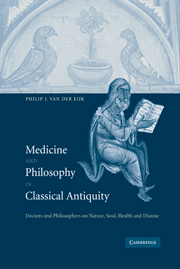 Medicine and Philosophy in Classical Antiquity
Medicine and Philosophy in Classical Antiquity Book contents
- Frontmatter
- Contents
- Acknowledgements
- Note on translations
- Note on abbreviations
- Introduction
- I HIPPOCRATIC CORPUS AND DIOCLES OF CARYSTUS
- 1 The ‘theology’ of the Hippocratic treatise On the Sacred Disease
- 2 Diocles and the Hippocratic writings on the method of dietetics and the limits of causal explanation
- 3 To help, or to do no harm. Principles and practices of therapeutics in the Hippocratic Corpus and in the work of Diocles of Carystus
- 4 The heart, the brain, the blood and the pneuma: Hippocrates, Diocles and Aristotle on the location of cognitive processes
- II ARISTOTLE AND HIS SCHOOL
- III LATE ANTIQUITY
- Bibliography
- Index of passages cited
- General index
2 - Diocles and the Hippocratic writings on the method of dietetics and the limits of causal explanation
Published online by Cambridge University Press: 22 September 2009
- Frontmatter
- Contents
- Acknowledgements
- Note on translations
- Note on abbreviations
- Introduction
- I HIPPOCRATIC CORPUS AND DIOCLES OF CARYSTUS
- 1 The ‘theology’ of the Hippocratic treatise On the Sacred Disease
- 2 Diocles and the Hippocratic writings on the method of dietetics and the limits of causal explanation
- 3 To help, or to do no harm. Principles and practices of therapeutics in the Hippocratic Corpus and in the work of Diocles of Carystus
- 4 The heart, the brain, the blood and the pneuma: Hippocrates, Diocles and Aristotle on the location of cognitive processes
- II ARISTOTLE AND HIS SCHOOL
- III LATE ANTIQUITY
- Bibliography
- Index of passages cited
- General index
Summary
INTRODUCTION
In antiquity Diocles of Carystus enjoyed the reputation of being a ‘younger Hippocrates’, or ‘second in fame and venerability to Hippocrates’. Yet this did not prevent him from developing his own ideas and from writing medical treatises in his own style in the Attic dialect. To be sure, later reports on his doctrines often represent him as being in perfect agreement with ‘Hippocrates’ on various subjects; but the fragments of his works that have been preserved, show that the authority of ‘the great Coan’ did not prevent him from taking issue with some ideas and practices that are similar to what is to be found in texts which we call Hippocratic. Of course we do not know whether Diocles, if he had actually read these works, took them to be by Hippocrates – in fact, if we accept Wesley Smith's suggestion that the Hippocratic Corpus was created by third-century Alexandrian philologists who brought together a number of anonymous medical works into one collection under the name of Hippocrates, we may wonder whether anything like Hippocratic authority already existed in Diocles' time (not to mention the fact that Diocles' date itself is the subject of another controversy). It is not even certain that Diocles had ever heard of Hippocrates or was familiar with any of his genuine works.
This heaping up of uncertainties at the beginning of this chapter may appear a rather weak rhetorical strategy.
- Type
- Chapter
- Information
- Medicine and Philosophy in Classical AntiquityDoctors and Philosophers on Nature, Soul, Health and Disease, pp. 74 - 100Publisher: Cambridge University PressPrint publication year: 2005
- 2
- Cited by


